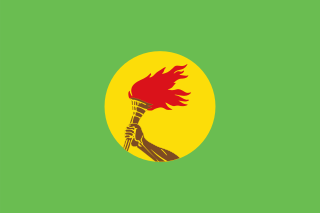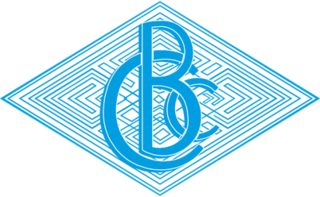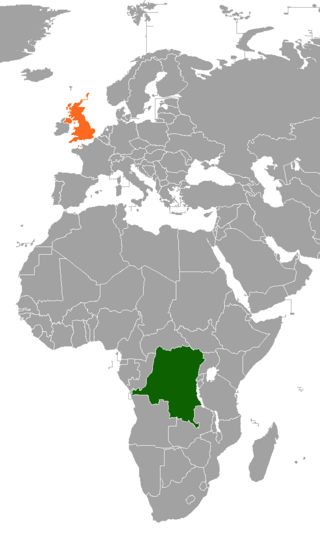| |||||
| Decades: | |||||
|---|---|---|---|---|---|
| See also: | History of Zaire | ||||
The following lists events that happened during 1973 in Zaire .
| |||||
| Decades: | |||||
|---|---|---|---|---|---|
| See also: | History of Zaire | ||||
The following lists events that happened during 1973 in Zaire .
| Date | Event |
|---|---|
| Late in the year the government decides to transfer all economic activity to citizens of Zaire. “Zairianization” of businesses is part of a broader plan to return to “African authenticity” in culture and to reduce the huge influence of the Catholic Church in health and education. [1] |

The economy of the Democratic Republic of the Congo has declined drastically around the 1980s, despite being home to vast potential in natural resources and mineral wealth; their gross domestic product is $69.474 billion as of 2023.

Zaire, officially the Republic of Zaire, was the name of the Democratic Republic of the Congo from 1965 to 1997. Zaire was located in Central Africa and was, by area, the third-largest country in Africa, and the 11th-largest country in the world. With a population of over 23 million inhabitants, Zaire was the most populous officially Francophone country in Africa, as well as one of the most populous in Africa.

Mobutu Sese Seko Kuku Ngbendu wa za Banga, commonly known as Mobutu Sese Seko or simply just Mobutu, was a Congolese politician and military officer who was the president of Zaire from 1965 to 1997. He also served as Chairman of the Organisation of African Unity from 1967 to 1968. During the Congo Crisis, Mobutu, serving as Chief of Staff of the Army and supported by Belgium and the United States, deposed the democratically elected government of left-wing nationalist Patrice Lumumba in 1960. Mobutu installed a government that arranged for Lumumba's execution in 1961, and continued to lead the country's armed forces until he took power directly in a second coup in 1965.

The Democratic Republic of the Congo (DRC), also known as Congo-Kinshasa, is a country in Central Africa. By land area, the DRC is the second-largest country in Africa and the 11th-largest in the world. With a population of around 112 million, the Democratic Republic of the Congo is the most populous officially Francophone country in the world. The national capital and largest city is Kinshasa, which is also the economic center. The country is bordered by the Republic of the Congo, Central African Republic, South Sudan, Uganda, Rwanda, Burundi, Tanzania, Zambia, Angola, the Cabinda exclave of Angola and the South Atlantic Ocean.

The national flag of the Democratic Republic of the Congo is a sky blue flag, adorned with a yellow star in the upper left canton and cut diagonally by a red stripe with a yellow fimbriation. It was adopted on 18 February 2006. A new constitution, ratified in December 2005 and which came into effect in February 2006, promoted a return to a flag similar to that flown between 1963 and 1971, with a change from a royal blue to sky blue background. Blue represents peace. Red stands for "the blood of the country's martyrs", yellow the country's wealth; and the star symbol the future for the country. It is one of the few national flags incorporating a diagonal line, with other examples including Tanzania, Namibia, Trinidad and Tobago, and Brunei.

The DR Congo national football team, recognised by FIFA as Congo DR, represents the Democratic Republic of the Congo in men's international football and it is controlled by the Congolese Association Football Federation. They are nicknamed Les Léopards, meaning: The Leopards. The team is a member of FIFA and the Confederation of African Football (CAF).
The Congolese franc is the currency of the Democratic Republic of the Congo. It is subdivided into 100 centimes. However, centimes no longer have a practical value and are no longer used. In April 2022, 2,000 francs was equivalent to US$1.

The First Congo War (1996–1997), also nicknamed Africa's First World War, was a civil war and international military conflict which took place mostly in Zaire, with major spillovers into Sudan and Uganda. The conflict culminated in a foreign invasion that replaced Zairean president Mobutu Sese Seko with the rebel leader Laurent-Désiré Kabila. Kabila's unstable government subsequently came into conflict with his allies, setting the stage for the Second Congo War in 1998–2003.

The University of Kinshasa, commonly known as UNIKIN, is one of the three major universities in the Democratic Republic of the Congo, together with the University of Kisangani and University of Lubumbashi. Originally founded in 1954 as Lovanium University during Belgian colonial rule, the current university was established following the division of the National University of Zaire (UNAZA) in 1981. It is located in Kinshasa.

Jean Nguza Karl-i-Bond was a prominent Zairian politician.

The Central Bank of the Congo is the central bank of the Democratic Republic of the Congo. The bank's main offices are on Boulevard Colonel Tshatshi in La Gombe in Kinshasa.

Law enforcement in the Democratic Republic of the Congo has historically been focused on furthering the state's aims with no regard for human rights. The Police nationale congolaise is the police throughout the territory of the Democratic Republic of the Congo. It was composed of between 110,000 – 150,000 officers as of 2010.

The Republic of the Congo was a sovereign state in Central Africa, created with the independence of the Belgian Congo in 1960. From 1960 to 1966, the country was also known as Congo-Léopoldville to distinguish it from its northwestern neighbor, which is also called the Republic of the Congo, alternatively known as "Congo-Brazzaville". In 1964, the state's official name was changed to the Democratic Republic of the Congo, but the two countries continued to be distinguished by their capitals; with the renaming of Léopoldville as Kinshasa in 1966, it became also known as Congo-Kinshasa. After Joseph Désiré Mobutu, commander-in-chief of the national army, seized control of the government in 1965, the Democratic Republic of the Congo became the Republic of Zaire in 1971. It would again become the Democratic Republic of the Congo in 1997. The period between 1960 and 1964 is referred to as the First Congolese Republic.

Democratic Republic of the Congo–United States relations are the international relations between the Democratic Republic of the Congo and the United States of America.

Democratic Republic of the Congo–Russia relations are the bilateral foreign relations between the Democratic Republic of the Congo and Russia. The Democratic Republic of the Congo has an embassy in Moscow and an honorary consulate in Yekaterinburg. Russia has an embassy in Kinshasa. The relations between the two countries were established on July 7, 1960, and restored since November 30, 1967.

Its location in the center of Africa has made the Democratic Republic of the Congo a key player in the region since independence. Because of its size, mineral wealth, and strategic location, Zaire was able to capitalize on Cold War tensions to garner support from the West. In the early 1990s, however, with the end of the Cold War and in the face of growing evidence of human rights abuses, Western support waned as pressure for internal reform increased.

The National University of Zaire was a federated university in Zaire. It was formed in August 1971 when the country's three existing universities and 17 technical colleges were merged into a single administrative structure. It was briefly known as the National University of the Congo until the Democratic Republic of the Congo became Zaire in October 1971.

Democratic Republic of the Congo–United Kingdom relations are the bilateral relations between the Democratic Republic of the Congo and the United Kingdom. The Democratic Republic of the Congo maintains an embassy in London and the United Kingdom maintains an embassy in Kinshasa.